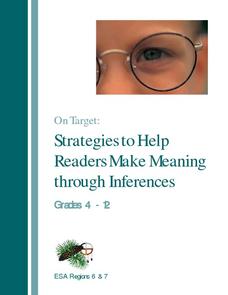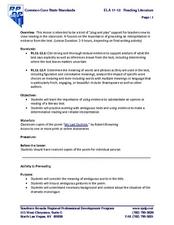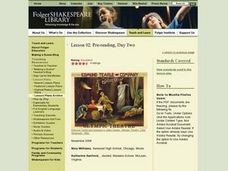K20 LEARN
Between The Lines: Inferences In The Narrative Life Of Frederick Douglass Excerpt
Good literature can be much like an iceberg requiring readers to presume that the bulk of the meaning may be inferred to be found below the surface. Here's a lesson that asks scholars to conduct a close reading of passages from The...
Southern Nevada Regional Professional Development Program
Close Reading in the Classroom
Close reading is key to the analysis and interpretation of literature. A close reading of the title and the epigraph of “The Love Song of J. Alfred Prufrock” offers readers an opportunity to examine how even single words or names can...
K20 LEARN
Here's How I Heard It: Using Folklore To Improve Close Reading Skills
"X" is for exaggeration, and "F" is for fact. To encourage close reading and to improve literary analysis skills, class members annotate fables and tall tales, like Paul Bunyan, with symbols that identify key features of this genre.
Curated OER
Using Pre-reading Strategies: Infer
Use this resource to support your class practicing inference with poetry and visual art. The plan calls for an examination of "The Scream" by Edvard Munch and the "Mona Lisa" to promote speculation about artist's intent. From there, it...
Teacher Web
Inferring Character Traits
Learning how to draw inferences from text is a key reading comprehension skill. Here's a worksheet that gives readers a chance to practice by offering 20 descriptive sentences and asking kids to identify the inferred character trait, and...
Curated OER
Shizuko’s Daughter: Selective Reading Guide
Examine the text of Kyoko Mori's Shizuko's Daughter with a reading guide. With questions that prompt kids to refer to the reading as well as to their own experiences and opinions, the guide is an effective way to keep them engaged with...
Curated OER
On Target: Strategies to Help Readers Make Meaning through Inferences
Here's a resource that explicitly teaches, models, and provides readers with opportunities to practice the process of drawing inferences from text. Packed with strategies elementary, middle, and high school teachers can use, the resource...
Curated OER
Mini-Lesson: Planning for Inferences
The five lessons in this resource are designed to teach class members how to read between the lines, how to use personal experience/background knowledge/schema, along with the information in the text, to make assumptions about what is...
Academy of American Poets
Teach This Poem: "In the Next Galaxy" by Ruth Stone
Imagine what life might be like in a different galaxy. That's the challenge young scientists take on in a warm-up activity designed to prepare them for a close reading of Ruth Stone's poem "In the Next Galaxy." After class members share...
K20 LEARN
You Think You Have Problems: Perspective in Multi-Genre Literature
Young scholars are asked to reflect on how personal experiences might influence points of view and perspectives. They read poems and biographies of the poets and then match the poem to the poet. To justify their matches, learners...
Texas Education Agency (TEA)
Distinguishing Between Inductive and Deductive Reasoning (English III Reading)
Is Sherlock Holmes an inductivist or a deductivist? Users of this interactive to distinguish between inductive and deductive reasoning. They consider in various situations whether it is better to list evidence and then introduce a claim...
K12 Reader
What Can You Infer?
Perhaps one of the most famous and illustrative stories featuring irony, "The Gift of the Magi" by O. Henry provides many opportunities for learners to make inferences about its characters. After reading a short introductory passage from...
CPALMS
Analyzing Vonnegut's View of the Future and His Commentary on the Present in Harrison Bergeron
Kurt Vonnegut's short story "Harrison Bergeron" engages adolescents with its theme about the dangers of complete societal equality. Learners complete a graphic organizer to track literary elements in the story, as well as an inference...
Penguin Books
Teacher’s Guide: Of Mice and Men by John Steinbeck
A 10-page guide to John Steinbeck's Of Mice and Men includes a brief plot summary, information about preparing readers for the language in the novel, pre-reading, during reading, and post-reading questions, essay prompts, and project...
Southern Nevada Regional Professional Development Program
Reading Literature - My Last Dutchess
Draw back the curtain, add a spot of joy to your class, and let learners be instructional activityed by a close reading exercise that models how to develop an interpretation based on evidence drawn from a text. Robert Browning’s dramatic...
Southern Nevada Regional Professional Development Program
Reading Literature - An Occurrence at Owl Creek Bridge
“An Occurrence at Owl Creek Bridge,” Ambrose Bierce’s short story, is used to model how structural moves, the decisions an author makes about setting, point of view, time order, etc., can be examined to reveal an author’s purpose. Groups...
Prestwick House
Catcher in the Rye Activity Pack
The Catcher in the Rye is the focus of a sampler that models some of activities included in a for-purchase packet based on J. D. Salinger's novel.
Illinois Mathematics and Science Academy
A Search for Symbolism in The Great Gatsby
After reading The Great Gatsby, groups return to the text and note passages where Fitzgerald uses symbols and color imagery in his narrative. They then develop a presentation that explains the context, the implications, and possible...
Curated OER
Tools of Persuasion
Ethos, pathos, and logos. After reading a passage about Aristotle's, three basic tools of persuasion, individuals answer a series of multiple choice comprehension questions and craft responses to three short-answer essay prompts.
Curated OER
"The False Gems" by Guy de Maupassant
Readers must go beyond the surface level of Guy de Maupassant's story, "The False Gems," to answer the questions on this worksheet. They must draw inferences, evaluate character's actions, and analyze how irony and symbolism give depth...
Curated OER
Shakespeare: Julius Caesar
Before your high schoolers read Julius Caesar, have them complete this thought-provoking activity! To familiarize them with some of the play's most important lines, break the class into pairs and have them create a skit around two lines...
Curated OER
Analyzing Atmosphere: Macbeth Murder Scene and Dagger Speech
Shakespeare's Macbeth (Act II, Scenes I and II) lacks explicit details of the murder of King Duncan, yet the author creates an atmosphere that allows us to visualize the event. Readers interpret the "Dagger Speech" by writing stage...
Penguin Books
A Teacher's Guide to the Signet Classics Edition of Charles Dickens's Great Expectations
Instructors expect great things from a good teacher's guide, and this one delivers. The 48-page guide to Charles Dickens's Great Expectations provides information about plot developments and new characters and places introduced in each...
IPDAE
Themes in Short Stories
"What is the theme of this story?" The very question can spark fear in the minds of readers and incinerate confidence. Here you will discover an exercise that shows how writers use the tools of setting, plot, conflict, and...

























